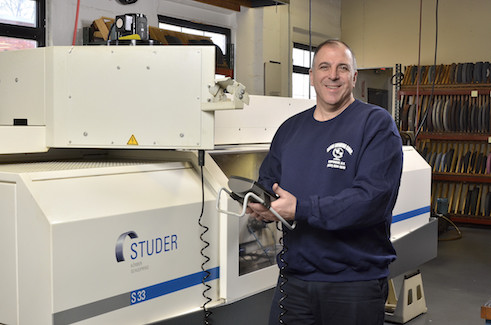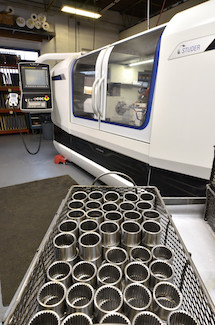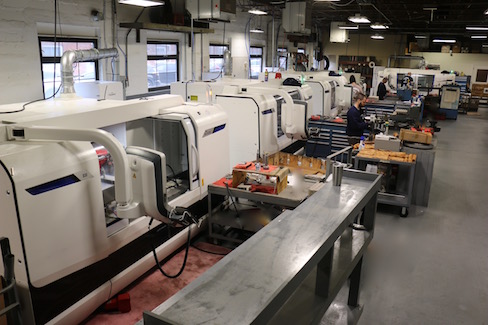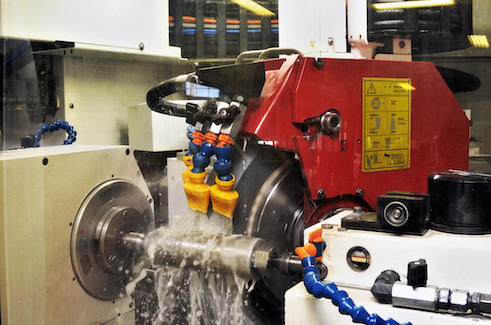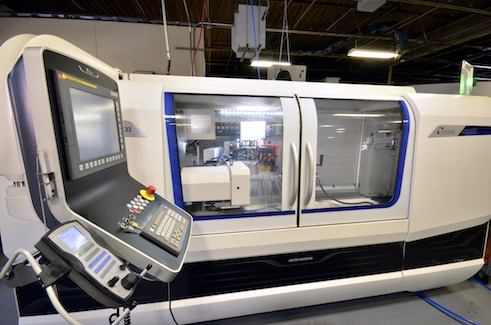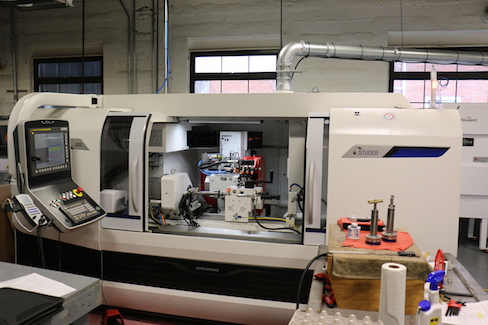NADCAP-Certified Job Shop Sets a Course for Automation
New York-based Globe Grinding faces the same skilled-workforce gap as other manufacturers. To meet the requirements of demanding aerospace customers, the company is deploying technology current employees can easily learn to program and operate.
Posted: May 6, 2020
BY JACOB BALDWIN
Founded in 1967 in Copiague, N.Y., Globe Grinding Inc. specializes in cylindrical and centerless grinding. The shop does some work for the automotive and motorcycle manufacturing sectors, but primarily serves medical and aerospace suppliers. Business has grown about 15% over the past year as new technology, such as a part-checking system, enables the shop to do jobs more quickly with its existing workforce.
And that’s important, because the skills gap is present even on Long Island. Despite its growth, Globe Grinding hasn’t hired many new employees, particularly experienced operators who can handle the most challenging work. Instead, the company works with suppliers and equipment OEMs to maximize machining capacity and lay the groundwork for automation.
Automation Increases Production Without Adding Personnel
The initial focus was on automating processes, such as measurement. To that end, Globe Grinding equipped more machines with post-gauging equipment instead of probing, which cut the time required to flag a part and perform length positioning to 6 seconds.
“With the gauging, it’s pretty much ‘set it and forget it’,” says President Jeff Rapisarda. “You still have to check the parts, make sure the finish is good, and that they’re to size. But then you have to double check, so the gauging is a big deal. Plus, you can put almost anybody on the machine after that.”
The next step involves transitioning to automation. Globe Grinding has used CNC technology since it bought a Studer S30 Lean Pro cylindrical grinder in 2000, but further automation presents a non-trivial integration problem. To increase production without adding personnel, the machines themselves must be configured for fully integrated part loading/unloading.
Globe Grinding has bought United Grinding’s Studer brand equipment for two decades. The shop routinely upgrades equipment; after acquiring a second S30 Lean Pro, for example, the shop sold the first machines (which retained much of their value) and bought an S33.
As a universal cylindrical grinder, the S33’s dual spindles permit external and internal grinding in one setup. For additional flexibility, the machines can be converted from live spindle grinding to grinding between centers.
The S33s tout a 0.000016-inch (0.0004 mm) standard roundness accuracy during live grinding and easily handle individual and batch production of medium-size workpieces. Globe Grinding purchased models with a distance between centers of 39.4 inches (1,000 mm) and center height of 6.9 inches (175 mm). With C axes, the machines can form and thread grind as well for the greatest level of process versatility.
Studer’s pioneering Pictogramming ensures the machines can be operated by less-experienced employees. Operators program the machine by assembling graphic pictograms, or subroutines, based on the desired results. Each cycle has its own symbol, or Picto, that enables process parameters to be queried in a simple dialog. The pictograms also access Studer’s workshop-based applications library and can execute pictogrammed cycles to accomplish setup, tool definition and management, corrections, creation of programs, and process visualization.
Most recently, the shop bought S33 models with the hydraulic tailstock required to integrate with United Grinding’s flexLoad automation solution. Standard on many Studer O.D. and I.D. grinding machines, the system loads/unloads in 6 seconds thanks to a fully integrated design and Fanuc 6-axis robot. A full-system enclosure protects operators with interlocking safety features that keep doors locked while still providing full access to the system’s three completed parts drawers.
In total, the system is expected to save nearly $2 million in labor costs and productivity enhancements over 15 years of five-day work weeks by increasing productivity 33% per shift.
Automation Makes Repeatability Easier to Achieve
Globe Grinding focuses on process control to maintain its position in the market. The shop’s customers, says Rapisarda, “want a paper trail and for their job to run on a specific machine, to be ground the same way every single time, with specific wheels, feeds and speeds and coolant.” For example, Globe Grinding must follow Boeing’s BAC5032 standard when grinding chrome-plated parts.
So in addition to automation-ready grinding equipment, Globe Grinding has further improved quality control and validation processes. Additional statistical process control (SPC) equipment and advanced laser gauging capabilities expedite record control. The facility itself was upgraded with new air-cleaning equipment and a dedicated room for compressors to better control the ambient noise level on the shop floor.
This, in combination with the National Aerospace and Defense Contractors Accreditation Program (NADCAP) certification Globe Grinding received in recent years, increased the shop’s confidence in its ability to partner with the world’s most advanced manufacturing companies.
“It’s a lot of paperwork,” confesses Rapisarda. “Where’d you do it, how’d you do it, what wheel did you use, what speeds and feeds with the CNC. You need to put a lot of things into your system to make sure everybody knows what to do when a job comes in.”
The speed and flexibility of its Studer machines also enable the shop to meet continually changing customer demands and deadlines. Workpiece materials range from standard irons to steels as well as stainless, titanium, and exotic aerospace alloys. Production volumes range from single parts to 1,000-piece lots, many of which must be held to tolerances of around 0.0001-inch. The shop usually juggles around 30 jobs on the floor at any one time.
Rapisarda’s father founded Globe Grinding in 1967; Jeff and his brother Rob run the shop. Rapisarda plans to keep it a family business, with his son Michael set to take over in a few years. As a result, the next Rapisarda to oversee Globe Grinding is taking classes with OEMs and gathering more experience in grinding technology. Always quick to embrace change, Rapisarda has made continuous improvement key to the shop’s success.
“Many aspects have changed – from coolant to grinding wheels to grinding machines – due to the ever-increasing demands for tight-tolerance, high-quality parts,” he says. And with the addition of part-checking and other advanced systems, as well as the promise of automated processes to come, the shop will likely continue to navigate its way to success.





